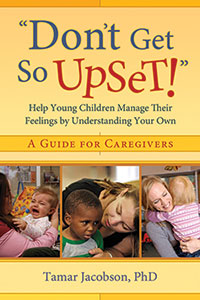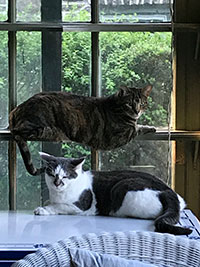Tamar Jacobson, PhD
Published: 2018
Attention seeking is frequently seen as misbehavior in young children and giving them the attention they need is often interpreted as a reinforcement of bad behavior. But all children need our attention. In Everyone Needs Attention: Helping Young Children Thrive by Tamar Jacobson, PhD, focuses on how adults manage our emotions when children seek our attention, and offers self-reflection when sifting through appropriate guidance strategies.
Learn more about Dr. Jacobson's journey to Everyone Needs Attention, and her hopes for the field of early childhood education.
What prompted you to write Everyone Needs Attention?
I was overjoyed when the editors at Redleaf Press agreed that I write this book, for I have been concerned about this issue for decades. In fact, the specific topic of children’s need for attention developed out of my earlier book: “Don’t Get So Upset!" Help Young Children Manage Their Feelings by Understanding Your Own.
During the last eight years or so, I facilitated professional development workshops and presentations all over the country about teachers’ emotions influencing their discipline strategies. Time and again teachers wanted advice about what to do when children need our attention. Their questions and anxieties reflected an attitude that children’s wanting attention is a bad thing. As an early childhood teacher educator, I noticed that preservice undergraduate and graduate students had the same ideas. When I go out into the field to supervise early childhood education students at their sites, I observe their cooperating teachers time and again punishing children who are asking for attention. Most educators believe that children need to self-regulate. While I agree that children cannot always get what they want, and of course they need to learn that there are limits, I continue to observe children receiving harsh punishments when, in fact, they are longing for relationship. Self-regulation, while important for teaching children limits, and the behavioral norms of our society, also require small children to go it alone emotionally and learn not to reach out or lean on those adults who care for and educate them. There has to be a balance between needing attention and learning to delay gratification. But this can be taught through connection and relationship, not by exclusion and punishment.

Why is it important for adults to reflect on how they sought attention as children?
I believe self-reflection about how we were disciplined, or how we sought attention is crucial for us in our emotional work with children because when I become more aware of how I tick emotionally, I am able to be more intentional, and have more options in choosing how to behave – not only with children but, in fact, with everyone in my life. We leave this type of self-reflection unexamined because we put aside emotions that were too uncomfortable to deal with when we were children. Children benefit greatly from authentic relationships with us. They learn from us about their self-identity, and how to be critical thinking, responsible citizens of the world. When we are humane to them, they learn to be humane to others. When we allow them to explore their emotions safely, they trust us more. And when they trust us, they not only open themselves up to learn more and more from us, but also to share some of their innermost feelings with us. If we were not allowed to explore our own emotions safely when we were children, it becomes challenging for us to know how to behave differently and create safe emotional spaces for the children in our care.
What do you hope readers of Everyone Needs Attention will take with them?
In order to answer this question, allow me to share with you what I wrote in the preface of the book:
“One morning, I received an email from a friend, who wrote:
‘Good luck with the writing. I hope it is cathartic. I am sure that your plumbing the depths of memory will be redemptive - in helping so many others to pay attention to children, with an open heart.’
My friend's words help me realize how important this book is for me. It feels like it has been residing inside my brain for all my life. I have no illusions that it will change the world, or even sell very well - most education books don't! But, really, if it helps even one adult pay attention to one child with an open heart, I will feel satisfied. I know that when I was young, I would have followed people to the ends of the earth if I felt, for a brief moment, that they related to me - accepted me with compassion and understanding, and I am certain that many moments that came from the kindness of strangers along the way saved me and nurtured my resilience” (Pages xv-xvi).
Is there a trend in the professional field of early childhood that has your attention now?
Since hearing Bruce Perry speak two decades ago, and having been a fellow in his ChildTrauma Academy, I am still convinced that the most important issue in our field is the quality of relationships adults develop and nurture with young children. Emotional memory affects brain development, attachment, and children’s sense of well-being and mental health from a very young age. While I also educate and inform early childhood teachers about curriculum, assessment, and how to work with parents, I predominantly focus on reflective practice specifically as it relates to understanding how teachers’ emotions affect their interactions with children.
You were born in Rhodesia, now Zimbabwe, lived in Israel, reside in Philadelphia and work in New Jersey. Given your global perspective have you noticed common threads in different cultures in the field of early childhood education? Is there something being done elsewhere that you’d love to see become a regular practice in the US, or globally?
All over the world people work hard to care for and educate young children. In some countries, governments are more enlightened about the importance of quality early childhood education, and professional development for teachers. They compensate teachers appropriately and require the people who care for children to have at least a bachelor’s degree. They also support families with up to a year’s leave to care for their infants. I have been shocked at how poorly funded child care is in the United States, how badly paid early childhood teachers are, and I am especially broken-hearted at how little support families receive for staying at home to care for their newborn children.
One thing I would love to see as a regular practice in the United States is creative playgrounds for young children. When I was a preschool teacher in Israel, our yard was full of all kinds of equipment for children to creatively play: Old tires, blankets, large rocks and slabs of wood, as well as vegetable and flower gardens. In my preschool yard, we even had an old car with its doors and the engine was taken out. Children were able to play in a real old car. In those days litigation was not an issue, and children were allowed to explore, experiment, build, construct, and play out of their most imaginative selves. In the States, I see far too many plastic playgrounds with very little for children to do except slide up and down. Even the teachers supervising children in these kinds of playgrounds seem to be bored. They stand around with hands in their pockets, yawning and gossiping with fellow teachers. It’s as if they don’t realize just how important creative and imaginative play is for young children!
What do you know now that you wish you’d known when you began your career?
I wish I had more confidence in myself when I began my career. I spent years going in and out of confidence. I am sure that during those times that I felt less worthy I was not an effective teacher of young children. Insecurity and lack of confidence can cause us to feel angry or resentful in general. These are not helpful emotions when working with young children and families. From years of caring for young children, I have learned three lessons. Developing compassion is crucial for working with children and families; it is important to have a playful attitude, and emotions are more complex than emoticons. And thanks to acquiring a higher education, I developed confidence in my knowledge and competence as an early childhood professional.
When you’re not busy writing, teaching or presenting at conferences, how do you spend your time?
First and foremost, I adore taking care of my cats, who also feature in my book! I also love walking around my neighborhood and on Forbidden Drive by the Wissahickon Creek. I have regularly joined my older sisters for 50-100-mile hikes in England and the island of Corfu. Yes, I do love to travel. Recently I joined a book group because I am finding more time to read novels – as well as doing water aerobics and weight training with a different group of women, and I am enjoying all that very much, especially because some of these people are becoming good friends as well. I always enjoy going to movies or shows. This year I was thrilled when my son and daughter-in-law bought us tickets to Hamilton in New York City for me and my husband’s birthdays. That was a spectacular experience – unforgettable. I never have a moment to spare, because life is filled with loving family relationships and good friendships, and as I become older, I love to move and groove more and more!

What projects are you working on now?
Apart from preparing for retirement from my university faculty position at the end of next year, and writing regularly on my blog, I am also thinking about writing a book for parents called: A Handbook of Guilt for Parents. I would like it to be somewhat humorous even though I know how hard it is to be a parent, and to know how to do the right thing by our children. There are so many forces and sources telling parents what works for everyone’s unique child. So much advice out there! It can be head spinning for parents. I’d like to give them a break, and allow them to be released from guilt and shame, and learn to be compassionate with themselves – by sharing my own experiences and feelings as I parented my son – and as I continue to develop my relationship with him even as he is a grown man of 45.
What’s on your bucket list—in your career or personally?
This question always baffles me. I think if I am honest with myself I have always tried to follow my heart personally and professionally. This hasn’t always been easy, and as a result, I have at times made poor life decisions. On the other hand, I think I have mostly reached out with enthusiasm and excitement and grasped opportunities that came my way. This included different relationships, as well as travel, academic and scholarly prospects. As a result, I don’t really feel like I have a bucket list, because while I have become more responsible and cautious as I become older, I am still fortunate enough to be able to seize interesting or intriguing opportunities that might come my way. I guess, though, it would be fun to be interviewed by Oprah!
Learn more and see a full list of titles by Tamar Jacobson.